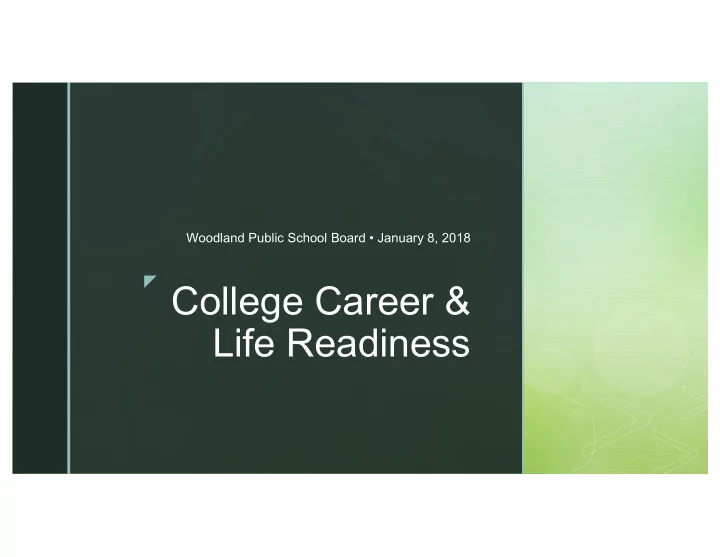

Woodland Public School Board • January 8, 2018 z College Career & Life Readiness
z The Future of the U.S. Workforce The Limited Career Prospects for High School Graduates without additional Education and Training Finding #1: The U.S. workforce will require more education and § skills in the near future Finding #2: Low skills jobs provide few opportunities for § advancement or security Finding #2: The skills mismatch is real § Finding #4: There are many pathways to middle and high skill § jobs, but education and training be3yond high school is the common denominator
z The Future of the U.S. Workforce The Limited Career Prospects for High School Graduates without additional Education and Training The employment picture is bleak for individuals who do not continue their § education beyond high school — and even more bleak for those who do not earn a high school diploma Workers with only a high school education face not only more limited job § prospects but also lower wages, lower prestige and more limited career advancement pathways. If individuals want to have a foothold in the middle class, then they will need to § pursue additional education and training to access middle and high skills jobs. It is clear that a K–12 education that prepares graduates for entry — without § remediation — into postsecondary pathways gives them the best foundation from which to make choices about their careers — choices that are predicated on more options and more doors being open rather than shut for lack of adequate academic preparation.
z The Future of Jobs and Training § Theme 2: Learners must cultivate 21st-century skills, capabilities and attributes § Tough-to-teach intangible skills, capabilities and attributes such as emotional intelligence, curiosity, creativity, adaptability, resilience and critical thinking will be most highly valued
z
z
z
z What is College and Career Readiness By 2020 65% of all jobs and 92% of STEM Jobs will require postsecondary education and training. College and career ready graduates should be able to succeed in entry-level postsecondary courses without remediation. Mastery of rigorous knowledge and skills in core academic § disciplines The skills and dispositions necessary to be successful in § charting their postsecondary path Successfully participated in postsecondary opportunities §
z Are They Really Ready to Work? Partnership for 21 st Century Learning Top Five Most Important Skills § Professionalism § Teamwork § Oral Communication § Ethics & Social Responsibility § Reading Comprehension
z The 4C’s—”Super Skills for the 21 st Century Partnership for 21 st Century Learning Communication— Sharing thoughts, questions, ideas, and solutions Collaboration— Working together to reach a goal — putting talent, expertise, and smarts to work Critical Thinking— Looking at problems in a new way, linking learning across subjects & disciplines Creativity— Trying new approaches to get things done equals innovation & invention
z Career and Technical Education (CTE) Programs for Woodland Students
College Level Remediation Rates 50.0% 45.0% 40.0% 35.0% 30.0% 25.0% 20.0% 15.0% 10.0% 5.0% 0.0% Woodland State Woodland State Woodland State Woodland State Math or English Math English Math and English 37.3% 32.9% 29.4% 28.4% 11.8% 13.6% 3.9% 9.1% 2015 44.4% 33.2% 42.2% 28.6% 13.3% 14.1% 11.1% 9.4% 2014 36.0% 34.5% 34.0% 29.8% 24.0% 15.2% 22.0% 10.5% 2013 42.1% 37.0% 40.4% 32.3% 21.1% 16.0% 19.3% 11.3% 2012 37.0% 38.8% 30.4% 34.2% 19.6% 16.7% 13.0% 12.1% 2011 2015 2014 2013 2012 2011
Post Secondary Enrollment 70% 60% 50% 40% 30% 20% 10% 0% Woodland State Woodland State Woodland State All College Going WA Public 2yr WA Public 4 yr 39.6% 59.9% 22.6% 25.7% 8.5% 20.5% 2015 44.2% 61.1% 21.4% 26.8% 7.8% 20.2% 2014 39.2% 61.5% 26.6% 27.3% 8.4% 19.8% 2013 41.7% 60.4% 26.2% 27.6% 7.7% 19.5% 2012 40.0% 59.9% 24.1% 28.2% 7.6% 18.4% 2011 2015 2014 2013 2012 2011
z WHS CLASS OF SPRING 2017 2015 POST GRADUATE SURVEY
z Senior Exit Survey Results 2012-2017
z What areas to you plan to pursue after High School 2012 2013 2014 2015 2017 2017 Working F/T 17 15 27 16 13 17 Military 7 13 9 5 7 7 4 yr College 22 23 23 37 36 34 2 yr College 48 38 25 23 28 26 Voc/Tech 2 4 7 6 7 5 Other - 6 9 13 10 11
z Were school counselors and teachers helpful in the selection of a path to follow after High School? 2012 2013 2014 2015 2017 2017 Yes 70% 70% 69% 70% 78% 84% No 30% 30% 31% 30% 22% 16%
z Were you encouraged by school staff to furtyher your education at college/Voc. School/Military? 2012 2013 2014 2015 2017 2017 Yes 86% 90% 82% 82% 87% 88% No 14% 10% 18% 18% 13% 12%
z Were enough elective classes offered for you to explore different career opportunities? 2012 2013 2014 2015 2017 2017 Yes 76% 79% 72% 70% 72% 72% No 24% 21% 28% 30% 28% 28%
z Do you feel fully prepared for the transition to college or the workplace? 2012 2013 2014 2015 2017 2017 Yes 87% 87% 80% 79% 70% 67% No 13% 13% 20% 21% 30% 33%
Recommend
More recommend